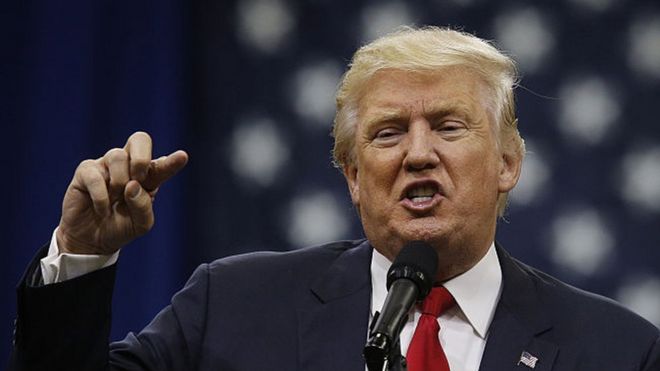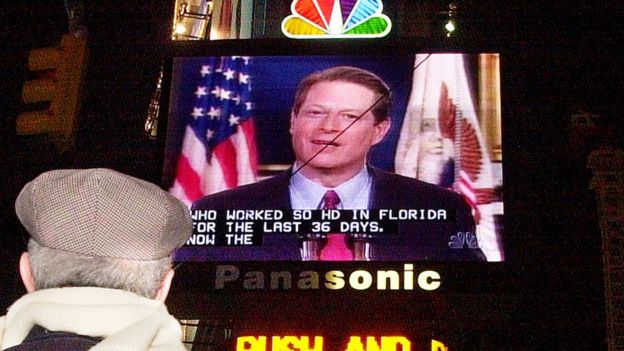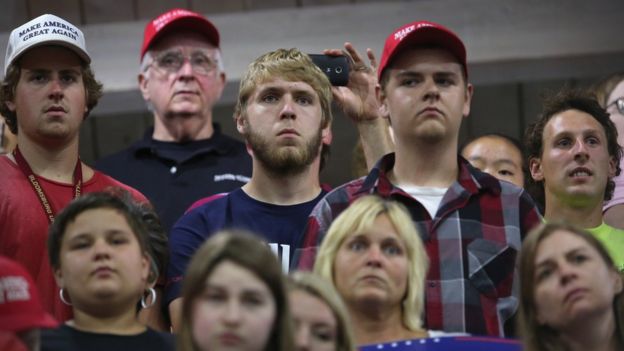Donald Trump spent much of his campaign breaking political norms. Depending on whom you ask, it's either one of his most endearing qualities or the greatest threat his candidacy poses.
Now, however, he's calling into question one of the foundations of US democracy - the legitimacy of its electoral process.
In the fever swamps on the left and the right, plenty of Americans have doubted the integrity of US elections.
They've levelled accusations of voter fraud. Or hacked voting machines. Or polling-place intimidation.
Some of the allegations even contain kernels of truth.
Many US voting electronic machines are woefully unsecure and produce no hard-copy backup. There have been instances of voter impersonation - although they're extremely isolated and usually involve absentee balloting. New Black Panther activity around Pennsylvania polling sites in 2008 inflamed conservatives, although a US Justice Department investigation found no illegal activity.
You don't have to dig too deep into social media or the partisan commentariat to find a thorough rehashing of any of these particular concerns. What you don't hear - at least not until now - is such accusations coming from the top of a presidential ticket.
At a rally on Monday Mr Trump said he was afraid that the November election "is going to be rigged" - backing up his statement by saying it was something he was hearing "more and more".
In a television interview, he repeated the warning.
"November 8th, we'd better be careful, because that election is going to be rigged," he said. "And I hope the Republicans are watching closely, or it's going to be taken away from us."
The "rigging" accusation isn't particularly new for Mr Trump, although he'd previously only levelled it toward the sometimes Byzantine candidate nomination process. It's much easier to question party systems that rely on state-by-state primaries and often poorly managed caucuses, as well as frequently altered delegate allocation procedures.
Mr Trump has said Hillary Clinton benefitted from a rigged Democratic Party apparatus to defeat Vermont Senator Bernie Sanders. (Mrs Clinton received roughly 3.7 million more votes than Mr Sanders, but recently released hacked emails indicate that the Democratic National Committee was manoeuvring to support the former secretary of state behind the scenes during the final months of the primary season).
Mr Trump also accused Republican Party officials of attempting to deny him the nomination, after presidential rival Ted Cruz took advantage of delegate rules to position himself to upset Mr Trump - who had a significant advantage in the popular vote - in a contested convention.
Calling the US presidential nomination system "rigged" can be overheated rhetoric, but that playing field is often tilted toward the establishment. US politics isn't too far from removed a time when nominees were picked by party bosses, while rank-and-file voters had little or no say in the process.
General elections are different. Their rules are set forth in state and federal law, overseen by courts and governed by provisions enshrined in the US Constitution.
"National elections have a clear cut set of rules," writes Josh Marshall of Talking Points Memo. "The only way to rig them is to change the vote numbers."
For Mr Trump to call the fairness of US elections into question - months before Americans head to the polls, no less - is a significant break with the tradition of presidential candidates paying respect to the electoral process, win or lose.
 GETTY IMAGES
GETTY IMAGES
Donald Trump spent much of his campaign breaking political norms. Depending on whom you ask, it's either one of his most endearing qualities or the greatest threat his candidacy poses.
Now, however, he's calling into question one of the foundations of US democracy - the legitimacy of its electoral process.
In the fever swamps on the left and the right, plenty of Americans have doubted the integrity of US elections.
They've levelled accusations of voter fraud. Or hacked voting machines. Or polling-place intimidation.
Some of the allegations even contain kernels of truth.
Many US voting electronic machines are woefully unsecure and produce no hard-copy backup. There have been instances of voter impersonation - although they're extremely isolated and usually involve absentee balloting. New Black Panther activity around Pennsylvania polling sites in 2008 inflamed conservatives, although a US Justice Department investigation found no illegal activity.
You don't have to dig too deep into social media or the partisan commentariat to find a thorough rehashing of any of these particular concerns. What you don't hear - at least not until now - is such accusations coming from the top of a presidential ticket.
At a rally on Monday Mr Trump said he was afraid that the November election "is going to be rigged" - backing up his statement by saying it was something he was hearing "more and more".
In a television interview, he repeated the warning.
"November 8th, we'd better be careful, because that election is going to be rigged," he said. "And I hope the Republicans are watching closely, or it's going to be taken away from us."
The "rigging" accusation isn't particularly new for Mr Trump, although he'd previously only levelled it toward the sometimes Byzantine candidate nomination process. It's much easier to question party systems that rely on state-by-state primaries and often poorly managed caucuses, as well as frequently altered delegate allocation procedures.
 GETTY IMAGES
GETTY IMAGES
Mr Trump has said Hillary Clinton benefitted from a rigged Democratic Party apparatus to defeat Vermont Senator Bernie Sanders. (Mrs Clinton received roughly 3.7 million more votes than Mr Sanders, but recently released hacked emails indicate that the Democratic National Committee was manoeuvring to support the former secretary of state behind the scenes during the final months of the primary season).
Mr Trump also accused Republican Party officials of attempting to deny him the nomination, after presidential rival Ted Cruz took advantage of delegate rules to position himself to upset Mr Trump - who had a significant advantage in the popular vote - in a contested convention.
Calling the US presidential nomination system "rigged" can be overheated rhetoric, but that playing field is often tilted toward the establishment. US politics isn't too far from removed a time when nominees were picked by party bosses, while rank-and-file voters had little or no say in the process.
General elections are different. Their rules are set forth in state and federal law, overseen by courts and governed by provisions enshrined in the US Constitution.
"National elections have a clear cut set of rules," writes Josh Marshall of Talking Points Memo. "The only way to rig them is to change the vote numbers."
For Mr Trump to call the fairness of US elections into question - months before Americans head to the polls, no less - is a significant break with the tradition of presidential candidates paying respect to the electoral process, win or lose.
 GETTY IMAGES
GETTY IMAGES
In 2000, after a contentious presidential contest that careened past election day and into an extended recount of the Florida vote and multiple rounds of lawsuits only settled by the US Supreme Court, Democrat Al Gore conceded defeat and called for unity.
"This is America," he said. "Just as we fight hard when the stakes are high, we close ranks and come together when the contest is done."
Eight years later, Republican nominee John McCain did his part to tamp down unrest within his own party following Barack Obama's election. When the audience booed his every mention of his opponent during his concession speech, he rebuked them.
"Please, please," he said to quiet the crowd.
"I urge all Americans who supported me to join me in not just congratulating him," he continued, "but offering our next president our good will and earnest effort to find ways to come together to find the necessary compromises to bridge our differences and help restore our prosperity, defend our security in a dangerous world, and leave our children and grandchildren a stronger, better country than we inherited."
Mr Trump's "rigged" language may simply be a rhetorical flourish from a candidate prone to extemporaneous musings - but it's already making the rounds among his supporters
In a podcast last week, long-time Trump advisor Roger Stone said that if the election results in November don't match opinion polls, the Republican nominee should challenge the validity of the election and warned that the unrest could end in a "bloodbath".
"If there's voter fraud, this election will be illegitimate," he said. "The election of the winner will be illegitimate, we will have a constitutional crisis, widespread civil disobedience, and the government will no longer be the government."
Such upheaval may be painfully familiar to those living in the world's less established democracies. It would be uncharted territory for the United States.

No comments:
Post a Comment